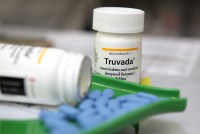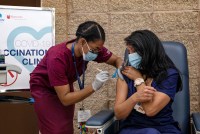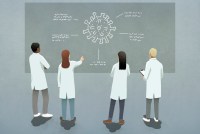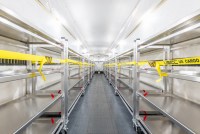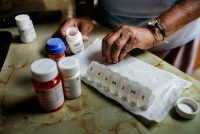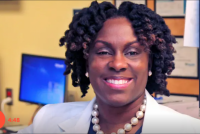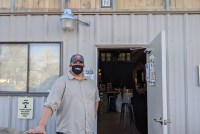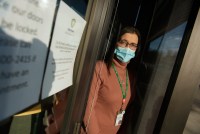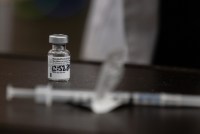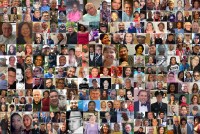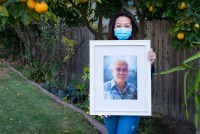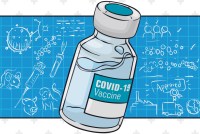Latest KFF Health News Stories
‘An Arm and a Leg’: A Look Back at 2020 — What We Learned and Where We’re Headed
T.K. Dutes — a former nurse who is now a radio host and podcast-maker — interviewed ‘An Arm and a Leg’ host Dan Weissmann about what he learned in 2020, and what’s ahead for the show.
Children’s Hospitals Grapple With Wave of Mental Illness
The disruption to daily life caused by the pandemic has increased the number of children seeking mental health care, further straining a system that already struggled to meet the need.
Many Health Plans Now Must Cover Full Cost of Expensive HIV Prevention Drugs
Most private insurance will be required to cover drugs, like Truvada, that offer protection against HIV infection, without making plan members share the cost.
Hospital Prices Just Got a Lot More Transparent. What Does This Mean for You?
Under a rule that kicked in Jan. 1, hospitals are required to make public the prices they negotiate with insurers. That’s a lot more information than was previously required, which was only the posting of “chargemasters” — the hospital-generated list prices that few consumers or health plans actually pay.
Eureka! Two Vaccines Work — But What About the Also-Rans in the Pharma Arms Race?
How two effective vaccines on the market make it so much harder to quickly test any competing vaccines.
Covid ‘Decimated Our Staff’ as the Pandemic Ravages Health Workers of Color
Covid-19 has taken an outsize toll on Black and Hispanic Americans — and those disparities extend to medical workers.
Children’s Hospitals Are Partly to Blame as Superbugs Increasingly Attack Kids
A growing body of research shows that overuse and misuse of antibiotics in children’s hospitals is helping fuel superbugs, which typically strike frail seniors but are increasingly infecting kids. And the pandemic is making things worse.
As long as humans encroach on nature, pandemics are inevitable — making it important to concentrate resources in areas where people and wildlife are linked.
‘Last Responders’ Brace for Surge in Covid Deaths Across US
In some parts of the country, the surge in covid cases is overwhelming coroners, morgues, funeral homes and religious leaders. It has required ingenuity and even changed the rituals of honoring the dead.
Seniors Face Crushing Drug Costs as Congress Stalls on Capping Medicare Out-Of-Pockets
While many private insurers cap what members pay in health costs, Medicare does not. Democrats and Republicans in Congress have proposed annual limits ranging from $2,000 to $3,100. But there’s disagreement about how to pay for that cost cap.
Video: The Healthy Nurse Who Died at 40 on the Covid Front Lines: ‘She Was the Best Mom I Ever Had’
Yolanda Coar was 40 when she died of COVID-19 in August 2020 in Augusta, Georgia. She was also a nurse manager, and one of nearly 3,000 frontline workers who have died in the U.S. fighting this virus, according to an exclusive investigation by The Guardian and KHN.
Live Free or Die if You Must, Say Colorado Urbanites — But Not in My Hospital
In a fracas between a largely rural county and neighboring cities, class and politics are just as relevant as the coronavirus. People are getting “stupid and mean,” as one mayor put it.
In Fast-Moving Pandemic, Health Officials Try to Change Minds at Warp Speed
It typically takes years of persuasion to change habits in the name of health safety. Local officials who are stuck with the responsibility of enforcing statewide pandemic-related mandates are trying to transform behavior fast.
Analysis: Some Said the Vaccine Rollout Would Be a ‘Nightmare.’ They Were Right.
There are already signs that the distribution of the COVID vaccines will be messy, confusing and chaotic.
More Than 2,900 Health Care Workers Died This Year — And the Government Barely Kept Track
The National Academy of Sciences cites journalists’ “Lost on the Frontline” project in a push to expand federal tracking of worker fatalities.
As the Terror of COVID Struck, Health Care Workers Struggled to Survive. Thousands Lost the Fight.
At least 2,900 health workers have died since the pandemic began. Many were minorities with the highest levels of patient contact.
KHN’s ‘What the Health?’: 2020 in Review — It Wasn’t All COVID
The coronavirus pandemic colored just about everything in 2020. But there was other health policy news that you either never heard or might have forgotten about: the Affordable Care Act going before the Supreme Court with its survival on the line; ditto for Medicaid work requirements. And a surprise ending to the “surprise bill” saga. Joanne Kenen of Politico, Anna Edney of Bloomberg News and Sarah Karlin-Smith of Pink Sheet join KHN’s Julie Rovner to discuss these issues and more.
Retiree Living the RV Dream Fights $12,387 Nightmare Lab Fee
A gynecologist in Carlsbad, New Mexico, tested the 60-year-old grandmother for various sexually transmitted infections without her knowledge. Her share of the lab fee was more than $3,000.
COVID Vaccines Appear Safe and Effective, but Key Questions Remain
The federal government expects vaccinations to be available to everyone who wants them by summer — though glitches are inevitable. If enough of us get vaccinated, we could wave goodbye to the pandemic in 2021.
At Risk of Extinction, Black-Footed Ferrets Get Experimental COVID Vaccine
Months before federal officials authorized experimental vaccines to ward off the coronavirus in humans, scientists tried a veterinary vaccine in endangered ferrets. Drugmakers are researching similar efforts for other animals proving vulnerable to the virus, such as farmed minks, in part to guard against virus mutations that could pose new risks to people.





